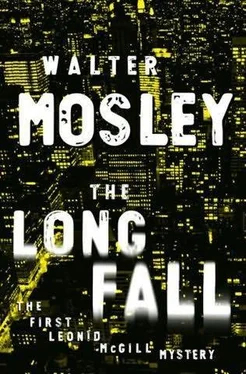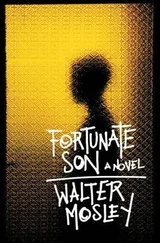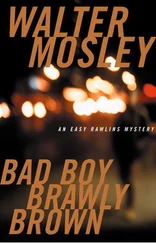Walter Mosley - The Long Fall
Здесь есть возможность читать онлайн «Walter Mosley - The Long Fall» весь текст электронной книги совершенно бесплатно (целиком полную версию без сокращений). В некоторых случаях можно слушать аудио, скачать через торрент в формате fb2 и присутствует краткое содержание. Жанр: Старинная литература, на русском языке. Описание произведения, (предисловие) а так же отзывы посетителей доступны на портале библиотеки ЛибКат.
- Название:The Long Fall
- Автор:
- Жанр:
- Год:неизвестен
- ISBN:нет данных
- Рейтинг книги:3 / 5. Голосов: 1
-
Избранное:Добавить в избранное
- Отзывы:
-
Ваша оценка:
- 60
- 1
- 2
- 3
- 4
- 5
The Long Fall: краткое содержание, описание и аннотация
Предлагаем к чтению аннотацию, описание, краткое содержание или предисловие (зависит от того, что написал сам автор книги «The Long Fall»). Если вы не нашли необходимую информацию о книге — напишите в комментариях, мы постараемся отыскать её.
The Long Fall — читать онлайн бесплатно полную книгу (весь текст) целиком
Ниже представлен текст книги, разбитый по страницам. Система сохранения места последней прочитанной страницы, позволяет с удобством читать онлайн бесплатно книгу «The Long Fall», без необходимости каждый раз заново искать на чём Вы остановились. Поставьте закладку, и сможете в любой момент перейти на страницу, на которой закончили чтение.
Интервал:
Закладка:
By way of the stairs I entered into a dull green corridor on the seventh floor and turned right, following the slender hallway past five doors to offices that were permanently locked. It was only the unremarkable sixth door that had any life behind it.
I knocked and waited. A minute went by but I didn’t knock again. Another minute passed and I waited patiently. A few seconds later there came a loud click. The portal eased open on its own and I walked in.
THE ANTECHAMBER TO the Important Man’s office was as bare as an office can get while still serving a function. There was a maroon metal desk with a no-frills swivel chair behind it and another folding chair set up in the corner. There were no paintings on the light-green walls, no carpeting on the unstained but sealed pine floor. There weren’t even any light fixtures, just two high-wattage stand-up lamps set in opposite corners.
Behind the desk was seated, as erect as a high school teacher in a Norman Rockwell painting, an effeminate, forty-something black man wearing gold-rim glasses and no smile. His burgundy necktie was thin enough to qualify as string and the black suit was tight fitting with stingy lapels.
This man was Christian Latour.
As I have said before, this was the year 2008, and race, though still a major player in American culture, had undergone a serious transmogrification. A black man was running for president. There was a legally blind black man in the governor’s seat in Albany. White American children and adults had heroes from Snoop Dogg to Tiger Woods. This wasn’t the age of being pushed to the back of the bus or excluded from the awareness of the media.
Seeing this arrogant and thin Cerberus before me, I remembered my father once telling me, “There is no greater slave name than Christian. Bill and Robert and Joseph and Dorothy are all equally qualified slave names. Any name that reflects the conqueror is a nod to his superiority. But to take his religion as your appellation is like falling down on your knees before him.”
My father had never met Christian Latour. This man was the epitome of defiance. He hadn’t so much taken on the name but rather he took it away from the people who once owned it. He sat like a Catholic cardinal in that simple throne, and you would never call him subservient or a victim.
“Mr. McGill,” he said, neither in greeting nor as a question. It was just a comment.
“Mr. Latour,” I responded.
“You don’t have an appointment.”
“I didn’t hó"3"fonave the leisure to make one.”
I liked Christian. He was so righteous in his monklike cell. He had one of the most important jobs in the Western Hemisphere and even though no one knew it he was in no way nonplussed by this anonymity. He was satisfied in his own skin, and that was a rare feat for any American.
Even though I liked him, Mr. Latour did not approve of me. I was coarse and gruff, listening to barrelhouse blues while he dreamed in operatic splendor.
There was a black box on Christian’s metal desk. There was a small aperture in the top through which light of any of the primary and secondary hues of the color wheel could shine. The hole shone a brilliant blue. Christian glanced at it and let his lip curl slightly.
“Mr. Rinaldo will see you now.”
Ê€„
30
Where Christian’s cubicle was barren and undersized, his boss’s grand hall of an office was a study in opulence. Thick burgundy carpets ran between royal-blue walls upon which hung Renaissance masterpieces lit from the ceiling by spotlights, artwork on loan from the Metropolitan Museum of Art (which has a policy of not lending out its possessions).
Ten steps into the room I passed a fully stocked mahogany bar built into the wall on the right. Across the way, on the left, was an altar carved from a solid block of apple-green-and-white jadeite. This sacred stand was tall as a man and twice as wide. Images of faces and animal forms, gracefully understated, flowed across the priceless sculpture.
There was no window, no portal to the outside world, but a green, red, and blue songbird with long, drooping feathers sang out gloriously as I passed. It was a greeting, or possibly a warning, but regardless the tune subsided before I had taken the final twenty-three steps to Alphonse Rinaldo’s desk.
He was standing behind a dining-table-sized piece of furniture made from a single plank of unfamiliar dark wood. He always stood when I entered the room. Maybe he did that with everyone—I don’t know.
Alphonse was of medium height (that is to say an inch or three taller than I), with flawless medium-white skin, black hair, and hard dark eyes. To the casual observer he might have seemed to be of a mild temper, but many of the worst monsters I’ve known were like that: pleasant even in the regrettable act of murder.
His hair, which was neither long nor short, was perfectly coiffed, and his suit would have turned Giorgio Armani’s head.
“Have a seat, Mr. McGill.” If quicksilver could talk it would sound like him.
The chair I preferred, Alphonse had once told me, was pre-Columbian, carved from a single piece of volcanic rock.
“It was used for sacrifices,” he’d said on that day a few years earlier. “There was a tray that lö
I suppose I must have looked a little uncomfortable, because he added, “Don’t worry, Mr. McGill, it was used exclusively on virgins.”
I had once asked Rinaldo if he answered directly to the mayor.
“I am the special assistant to the City of New York,” he answered as if there were a grim god that lived under the stone and steel, concrete and grime, of the city, a god whose will carried more weight than any politician or generation of voters.
And if Manhattan was an ancient deity set to oversee our island and its neighbors, then Alphonse Rinaldo was an errant angel thrown down among swine. He could buy your soul from a third party and send it twirling like a glass top on the granite stairs of justice. He was without peer, the most dangerous man in New York City. And he almost always knew more than anyone else in the room.
I HAD DONE the special assistant a favor some years before. There was a certain gentleman named Todd who had so much money that he owned a sprawling single-story home set atop a midtown skyscraper and encased in one-way glass. He could see out but the world could not see in.
Todd’s daughter was in love with a man the family considered beneath them. I was brought in to incriminate the gentleman in question. They had considered “other means” of dealing with the problem, but in the final analysis Todd didn’t want his daughter to suffer distress.
Alphonse asked me to find or manufacture evidence that would convince the daughter of her lover’s turpitude (Alphonse’s word, not mine). It was a complex job because even though the boyfriend may have been seen as low class by the Todds, he belonged to another kind of family that wielded a great deal of very raw, very physical power.
Alphonse was well aware of the situation and had reasons within reasons for me to be successful, and not . . . but that’s another story.
In the end no one was happy, but I had made a connection with the Important Man, and so from time to time I did him favors, and he paid me back in kind.
I hadn’t seen Rinaldo since deciding to go from crooked to only slightly bent, so it was a tricky business, me asking for a favor today when I might well have to turn him down tomorrow. But the way I saw it, I had to live through today in order to suffer the ramifications of later on.
“WHAT CAN I do for you, Mr. McGill?” Rinaldo was all about the business. If he had friends, I wasn’t one of them. He didn’t care about my health or my day.
“I need to find one guy and get to another one.”
Читать дальшеИнтервал:
Закладка:
Похожие книги на «The Long Fall»
Представляем Вашему вниманию похожие книги на «The Long Fall» списком для выбора. Мы отобрали схожую по названию и смыслу литературу в надежде предоставить читателям больше вариантов отыскать новые, интересные, ещё непрочитанные произведения.
Обсуждение, отзывы о книге «The Long Fall» и просто собственные мнения читателей. Оставьте ваши комментарии, напишите, что Вы думаете о произведении, его смысле или главных героях. Укажите что конкретно понравилось, а что нет, и почему Вы так считаете.












